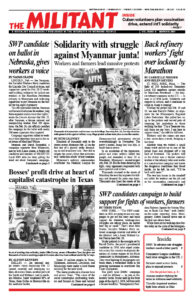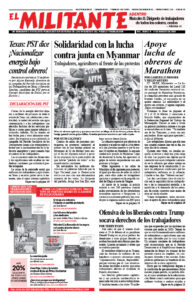LOUISVILLE, Ky. — “Not just those of us who are visually impaired, but all workers, have to fight for everything we get,” Dave Perry, a member of Teamsters Local 100 in Cincinnati, told participants at the Feb. 5 Militant Labor Forum here.
Perry described how he and fellow workers at the Teamster-organized factory run by the Cincinnati Association for the Blind and Visually Impaired have stood up to the bosses’ attacks. Workers slit tape; produce exit signs and craft and exam paper; assemble kitchen gadgets; and prepare products for shipment. Two-thirds of the workers, including Perry, are blind or visually impaired.
Bosses “tried to ignore seniority and pay rates, and workers’ safety, when they brought back workers after a COVID-related shutdown last spring,” Perry said. “And they put some people on different jobs, at lower rates of pay. They rearranged machines, eliminating the physical barrier keeping workers out of a danger zone where cranes move huge tape rolls to slitting machines.”
A high proportion of workers at the plant who are visually impaired weren’t initially called back to their jobs according to seniority, Perry said.
Some workers organized a petition against these violations and presented it to management. “We are still fighting for safety, pay, and to get everyone back in the building,” he added.
“I have learned over the years that you can’t be afraid to fight for rights — to get together, and really go for it,” Perry said. “Only by all of us sticking together are the bosses going to understand that we mean what we say.”
“All workers should support struggles of visually impaired workers,” Maggie Trowe, speaking at the forum for the Socialist Workers Party, said. “It’s part of unifying the working class and rejecting the bosses’ efforts to divide us. The fight of the Teamsters in Cincinnati strengthens all workers in our fight for our rights and dignity.”
Trowe, a Walmart worker, pointed to the efforts by Amazon workers in Bessemer, Alabama, to win representation for their union, the Retail, Wholesale and Department Store Union.
“They have won the right to a mail-in vote for union recognition,” she said. Trowe said the bosses are driven by the crisis of their capitalist system to push hard to defend their profits, attacking workers’ jobs, wages and working conditions. And there have been some important fights against those attacks.
She pointed to the example set “by nonunion miners in 2019 when they were laid off by Blackjewel Coal in Harlan, Kentucky, and bosses refused to pay them what they were owed with the blessing of a bankruptcy court.
“The miners blocked the railroad track leading out of the mine for two months, winning solidarity from working people and getting the pay that was stolen from them,” she said. “Last year miners at Quest Energy followed their example when bosses failed to pay their wages, winning the pay they were owed in just three days.”
Trowe also pointed to lessons from the historic wave of strikes and organizing drives in the 1930s described in the four-volume Teamsters series by Farrell Dobbs, a leader of those battles and of the SWP. Perry said he enjoyed hearing that the leaders of those fights preferred a short, page-long union contract.
“While some of us might have trouble reading more than a page,” he said, “the bosses clearly seem to have more difficulty sticking to even that length of a contract without us making them do it.”
“Taking part in labor struggles, protests against police brutality and other actions in the interests of the working class, builds workers’ self-confidence and class consciousness. Only working people can resolve the crisis we are facing today,” Trowe said.

